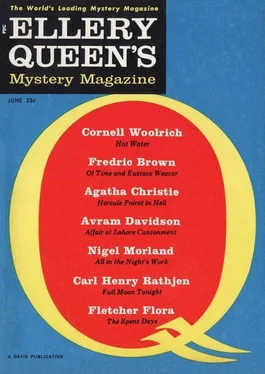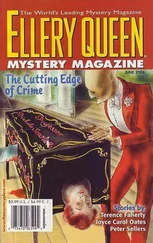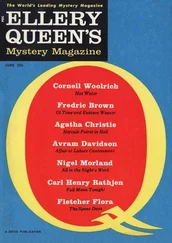Фредерик Браун - Ellery Queen’s Mystery Magazine. Vol. 37, No. 6. Whole No. 211, June 1961
Здесь есть возможность читать онлайн «Фредерик Браун - Ellery Queen’s Mystery Magazine. Vol. 37, No. 6. Whole No. 211, June 1961» весь текст электронной книги совершенно бесплатно (целиком полную версию без сокращений). В некоторых случаях можно слушать аудио, скачать через торрент в формате fb2 и присутствует краткое содержание. Город: New York, Год выпуска: 1961, Издательство: Davis Publications, Жанр: Классический детектив, на английском языке. Описание произведения, (предисловие) а так же отзывы посетителей доступны на портале библиотеки ЛибКат.
- Название:Ellery Queen’s Mystery Magazine. Vol. 37, No. 6. Whole No. 211, June 1961
- Автор:
- Издательство:Davis Publications
- Жанр:
- Год:1961
- Город:New York
- ISBN:нет данных
- Рейтинг книги:5 / 5. Голосов: 1
-
Избранное:Добавить в избранное
- Отзывы:
-
Ваша оценка:
- 100
- 1
- 2
- 3
- 4
- 5
Ellery Queen’s Mystery Magazine. Vol. 37, No. 6. Whole No. 211, June 1961: краткое содержание, описание и аннотация
Предлагаем к чтению аннотацию, описание, краткое содержание или предисловие (зависит от того, что написал сам автор книги «Ellery Queen’s Mystery Magazine. Vol. 37, No. 6. Whole No. 211, June 1961»). Если вы не нашли необходимую информацию о книге — напишите в комментариях, мы постараемся отыскать её.
Ellery Queen’s Mystery Magazine. Vol. 37, No. 6. Whole No. 211, June 1961 — читать онлайн бесплатно полную книгу (весь текст) целиком
Ниже представлен текст книги, разбитый по страницам. Система сохранения места последней прочитанной страницы, позволяет с удобством читать онлайн бесплатно книгу «Ellery Queen’s Mystery Magazine. Vol. 37, No. 6. Whole No. 211, June 1961», без необходимости каждый раз заново искать на чём Вы остановились. Поставьте закладку, и сможете в любой момент перейти на страницу, на которой закончили чтение.
Интервал:
Закладка:
She was still thinking of the little girl under the white birch beside the walk, and it seemed to her a favorable omen that she had come across her on this particular day.
It takes Jacks or better to open, she thought, feeling with the thought the delightful, tremulous sensation of inner laughter.
She rang the doorbell and waited, listening to the sounds of diminishing chimes, and soon the door was opened by a woman in the uniform of a maid. Conditioned air, escaping, flowed outward.
“Yes?” the maid said.
“I would like to see Mrs. Morrow,” Cora said.
“Who shall I say is calling?”
“Cora Rogan.”
“Will you state the nature of your visit, please?”
“It’s personal. If Mrs. Morrow will be so kind as to see me, I’ll take only a few minutes of her time.”
“If you’ll step in and wait a minute, I’ll speak with Mrs. Morrow.”
Cora stepped into a wide hall which divided ahead of her, ascending spirally on the right to the second floor and running on the left through the house to the rear.
The maid closed the front door and walked down the hall past the staircase, turning and disappearing into a room on the right side, and Cora remained standing in the cool, conditioned air. Her reflection waited with her, trapped in glass on a wall beside her, and she exchanged long looks with the reflection and smiled a little and was, on the whole, rather pleased.
She was thirty-eight now, no longer young, but she was slender as a girl in a beige linen suit, and her flesh was still firm, with only the slightest deepening of lines around the eyes and mouth, and she could still pass in soft light for what she really no longer was. Nowadays she grew tired more often than she had used to, of course, and once in a while she became a little frightened when she thought of the years that had gone so swiftly and the years that had still, somehow, to come and go.
Turning away from the reflection of herself, she looked slowly around the hall, her eyes moving deliberately from one thing to another, and she thought as she looked that it was much the same as it used to be. There was a new runner on the stairs, and the telephone on the table against the wall was pale green instead of black, and the painting on the wall above the telephone was different from the one that had hung there before — but nothing of any significance had changed, not even the basic colors or the subtle sense of character that houses have.
She took a couple of steps toward the stairs, her thin heels tapping sharply on the gleaming hardwood floor, and at that moment the maid reappeared suddenly in the hall at the rear and came forward.
“If you will come this way, please,” she said, “Mrs. Morrow will see you.”
Cora followed her down the hall and off to the right into a large room with high, wide windows and a pair of glass doors opening onto a flagstone terrace. The maid stopped just inside the room and nodded toward the doors, through which Cora could see, sitting in a bright canvas chair beside a glass-topped table, a woman in a sheer flowered dress. On the table were an open book, lying face down, and a pitcher and matching glasses.
Cora crossed to the glass doors and let herself out onto the terrace, and the woman, Julia Morrow, stood up beside the table and greeted her with an expression in which there was the slightest suggestion of curiosity.
“Good afternoon, Miss Rogan,” she said. “Will you sit down?”
“Thank you,” Cora said. “It’s kind of you to see me.”
It was clear, she thought, that her name meant nothing to Julia Morrow, for there was no evidence of recognition in the tone of her voice, nor even the careful kind of control one might exercise to exclude such evidence.
Moving across the flagstones to the glass-topped table, Cora sat down in a bright chair, and Julia Morrow resumed the one from which she had just risen. The chairs were not placed directly opposite each other across the table, only a small are of the circumference separating the two women. Their relative positions seemed to indicate a condition of intimacy, as if they had drawn together to exchange confidences.
“May I offer you some iced tea?” Julia Morrow said.
“No, thank you.”
“Then what can I do for you?”
“To tell the truth, it’s rather difficult to begin. I see that you don’t recognize my name.”
“You name? Cora Rogan? I’m sorry. Should I recognize it?”
“Perhaps not. I was our husband’s first wife.”
Now the expression of curiosity, wholly confined to Julia Morrow’s eyes, gave way for an instant to a flare of surprise. It was gone, however, almost before it was discernible, and afterward there was no expression except courteous reserve.
“I see. I knew that my husband’s first wife was named Cora, of course, but I had forgotten the rest of it. I understood that you had remarried.”
“So I had, but it pleases me to use my maiden name. I lived with my second husband in Europe. He’s dead now.”
“I’m sorry.”
“It was no great loss. We lived well, one way and another, but he left next to nothing. It’s apparent that you have done much better.”
“I have all that I need. Have you come to see me simply because we shared, at different times, the same man?”
“It occurred to me that I didn’t offer my sympathy at the time of his death. I thought I should come and do so.”
“After all this time? It was eight years ago — nearly nine.”
“So long as that? Time goes, doesn’t it? Or is it we? Someone wrote a poem about that once. About its being we who go instead of time. Was it Ronsard?”
“I don’t know. I read very little poetry.”
“It must have been terrible for you. To kill your own husband by mistake, I mean.”
“Yes. It was terrible.”
“As I recall, you thought he was a prowler. You shot him with a shotgun, I believe, as he was coming up the stairs. The light on the stairs, I remember, had gone out for some reason.”
“There was a prowler scare in the neighborhood. James had left the shotgun, loaded, in our room. I wasn’t expecting him home that night, and I was terrified. The recollection is painful, however, and I’d rather not discuss it.”
“Forgive me. The inquest, of course, was quite brief. Hardly more than a formality. You had, it seemed, absolutely no motive for killing your husband intentionally. Besides, your condition at the time solicited a great deal of sympathy.”
“I was expecting a child, if that’s what you mean.”
“Yes. Your daughter. A charming little girl. I met her beside the walk as I came up to the house. We played a game of jacks.”
“She’s rather casual with strangers. Ii disturbs me sometimes.”
“I envy you. I have no child of my own, even after two marriages. I remember how astonished I was when I first learned that you were going to have one.”
“Really? I wonder why.”
“I was, as I said, your husband’s first wife.” Cora smiled gently and looked away for a few moments with an air of abstraction, as if the remembrance were pleasant, although a little sad. “It was quite impossible for him to have children.”
Julia Morrow was also suddenly withdrawn. Only a faint expression of fastidious distaste indicated that she had heard the words and understood their implication.
“That’s absurd,” she said. “Are you suggesting that James was mutilated like that foolish character in the Hemingway novel?”
“Nothing so romantic.” Cora laughed softly and returned her gaze to the woman across the arc of glass. “To use your own term, it was really rather absurd. A kind of bad joke. Orchitis is the name for it. A complication of mumps.” She laughed again, softly, with a note of genuine amusement. “It was terribly humiliating to a man as vain as poor James. You don’t object to my calling him James, do you? It made him a comic character in his own eyes, and he wouldn’t have dreamed of confiding in anyone about his misfortune. At the time of his death, his doctor having died before him, I rather imagine no one alive was aware of it except three people. You and me, Mrs. Morrow, and James himself. I wonder, if it had been generally known, how it would have affected the inquest — in the matter of motive, I mean. It’s an interesting speculation, isn’t it?”
Читать дальшеИнтервал:
Закладка:
Похожие книги на «Ellery Queen’s Mystery Magazine. Vol. 37, No. 6. Whole No. 211, June 1961»
Представляем Вашему вниманию похожие книги на «Ellery Queen’s Mystery Magazine. Vol. 37, No. 6. Whole No. 211, June 1961» списком для выбора. Мы отобрали схожую по названию и смыслу литературу в надежде предоставить читателям больше вариантов отыскать новые, интересные, ещё непрочитанные произведения.
Обсуждение, отзывы о книге «Ellery Queen’s Mystery Magazine. Vol. 37, No. 6. Whole No. 211, June 1961» и просто собственные мнения читателей. Оставьте ваши комментарии, напишите, что Вы думаете о произведении, его смысле или главных героях. Укажите что конкретно понравилось, а что нет, и почему Вы так считаете.












